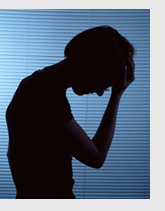Causes of Headaches |

|
| There are two types of headaches: |
Primary Headache include tension–type, migraine, cervicogenic, and cluster headaches and are not caused by other underlying medical conditions. More than 90% of headaches are primary.
Secondary Headache result from other medical conditions, such as infection or increased pressure in the skull due to a tumor. These account for fewer than 10% of all headaches. |
| Descriptions of the Primary Headache Types: |
1. Tension–type Headaches Tension type headaches are the most common, affecting more than 75% of all headache sufferers. As many as 90% of adults have had tension–type headache.
 Tension–type headaches usually involve a steady ache, rather than a throbbing one, are described as a feeling of pressure or tightening, may last minutes to days, affect both sides of the head, and and do not worsen with routine physical activity. It may also be accompanied by hypersensitivity to light and noise. Some people get tension–type (and migraine) headaches because of stressful events. Tension–type headaches may also be chronic, occurring frequently or daily Tension–type headaches usually involve a steady ache, rather than a throbbing one, are described as a feeling of pressure or tightening, may last minutes to days, affect both sides of the head, and and do not worsen with routine physical activity. It may also be accompanied by hypersensitivity to light and noise. Some people get tension–type (and migraine) headaches because of stressful events. Tension–type headaches may also be chronic, occurring frequently or daily
Rebound Headache: Rebound headache may occur among people with tension–type headaches, as well as in those with migraines. It can be the result of taking prescription or nonprescription pain relievers daily or almost every day, contrary to directions on the package label. If prescription or nonprescription pain relievers are overused, headache may "rebound" as the last dose wears off, leading one to take more and more pills. This is a great reason to call your chiropractor. Break that cycle! |
2. Cervicogenic Headaches Cervicogenic headache comes from disorders of the neck
Cervical headache is often brought on by neck movement and/or sustained awkward head positioning (such as painting the ceiling, or washing the floor) It can also cause stiffness in your neck, shoulder and arm pain. |
3. Migraine Headaches Migraine headaches are less common than tension–type headaches, but still migraines afflict 25 to 30 million people in the United States. As many as 6% of all men, and up to 18% of all women experience a migraine headache at some time.
Migraines may last 4-72 hours and involve the entire head. They can cause throbbing and are aggravated by routine physical activity.
Nausea, sensitivity to light and sound often accompany migraines. An "aura" may occur before head pain begins–– involving a disturbance in vision, and/or an experience of brightly colored or blinking lights in a pattern that moves across the field of vision. About one in five migraine sufferers experiences an aura.
Usually, migraine attacks are occasional, or sometimes as often as once or twice a week, but rarely occur daily. |
4. Cluster Headaches Cluster headaches are pretty rare, affecting about 1% of the population. They are different from migraine and tension–type headaches. Most cluster headache sufferers are male –– about 85%.
Cluster headaches come in groups or clusters lasting weeks or month. The pain is extremely severe but the attack is brief, lasting no more than a hour or two. The pain centers around one eye, and this eye may be inflamed and watery. There may also be nasal congestion on the affected side of the face.
These "alarm clock" headaches may strike in the middle of the night, and often occur at about the same time each day during the course of a cluster. A history of heavy smoking and drinking is common, and alcohol often triggers attacks. |
|




